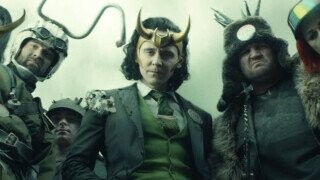‘Loki’ is Marvel's ‘Blockbuster Identity Crisis’ Story

What’s Loki all about? Admittedly, it’s hard to pin down one single overarching theme of a show that’s featured time travel, multiple apocalypses, and a Norse alligator god biting the hand off of their evil parallel universe self. But, with just one episode to go, we’d like to propose that Loki is very much a show about writing Loki.
A few entries in popular franchises have, in recent years, told stories that act as thinly-veiled allegories for their own creation, reflecting their creators’ own anxieties over making a big studio blockbuster. Most famously, Star Wars fans were split on The Last Jedi, which dismantled much of what made Star Wars tick, and unsubtly featured characters arguing over how strictly they should adhere to the “past.” Then there was Jurassic World which was literally about how trying to make Jurassic Park again was a terrible idea, complete with some nerd in an Old Navy graphic tee who wouldn’t shut up about how great the original “park” was.

Universal
Don't Miss
It’s as though the filmmakers behind these movies let their own artistic unease and internal conflict shape the drama of their stories. Loki has tapped into a similar meta vibe, telling the story of a wildly mischievous creative type who is captured and reigned in by an oppressive, Kafkaesque nightmare company, forced to toil away in a soul-crushing cubicle. As we’ve mentioned before, there are more than a few hints that the TVA may be a stand-in for the Walt Disney Company. Recent episodes have only added credence to that interpretation. In last week’s episode, Loki finally meets the mysterious, all-powerful Time-Keepers, who turn out to be nothing but animatronic characters.

Marvel Studios

Marvel Studios
In real life, it could be argued, Disney creatives are ultimately toiling away to create popular fodder for future lucrative theme park attractions, meaning that their masters really are, in a sense, mindless Pirates of the Caribbean-like automatons. Following his depressing realization, Loki is then thrust into a creative wasteland, a void full of Disney’s unwanted junk, including non-canonical Marvel oddities like Frog Thor and Thanos’ adorable helicopter.
The only way for Loki to escape this rut is for the show’s writers to rediscover their passion for writing this story, despite the fact that it’s all in service of a corporate behemoth. The answer is for the creatives behind the show, and Loki himself, to engage with their inner child. After all, isn’t that when our less cynical younger selves actually bought into the magic of blockbuster entertainment? For Loki, this is represented by him literally hanging out with himself as a child.

Marvel Studios
For the writers behind the show, they mirror Loki’s arc by reconnecting with their love of big franchise storytelling using references to some of the greatest blockbuster movies of all time, which they presumably grew up with. After a brief interlude of despondency, Loki’s story only gets back on track when he decides to hunt the monster Alioth, which he does, pointedly, using a Jaws reference.

Marvel Studios
And when Sylvie and Loki are attempting to enchant Alioth, Loki is forced to distract the beast in a moment that plays out very closely to the iconic flare scene in Jurassic Park.

Marvel Studios

Universal
Not to mention the fact that the endgame of the story has become all about finding the “man behind the curtain,” which is obviously a reference to the original beloved childhood blockbuster.
You (yes, you) should follow JM on Twitter! And check out the podcast Rewatchability.
Top Image: Marvel Studios